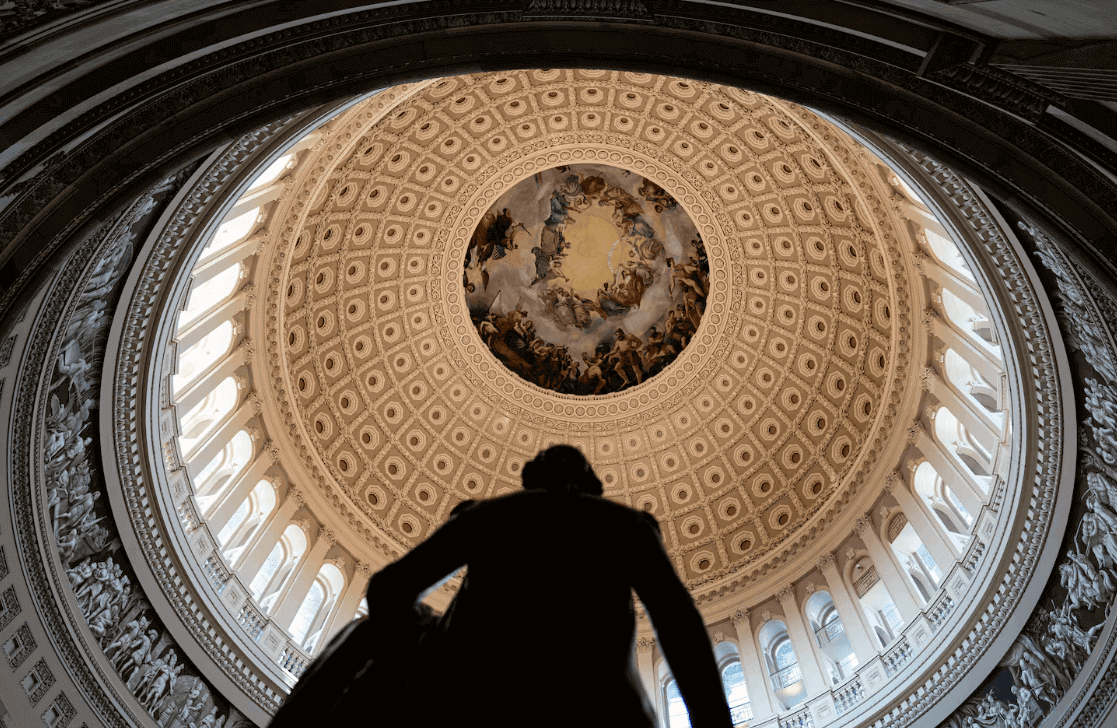特朗普的第二个任期对参议院的独立性提出了关键考验

【中美创新时报2024 年 12 月 2 日编译讯】(记者温友平编译)当选总统唐纳德·特朗普决心打破传统的政府护栏,这将对共和党控制的参议院能否保持其作为独立机构的宪法地位和对总统权力的制衡提出根本性考验。《纽约时报》记者卡尔·赫尔斯对此作了下述报道。
随着特朗普提出一系列有争议的潜在候选人,并威胁以其他方式挑战国会的权威,到明年 1 月将占据多数席位的共和党人可能会发现自己处于一个岌岌可危的境地,不得不在捍卫他们的机构和向无视政府规范的总统屈服之间做出选择。
最明显、最直接的紧张点可能是特朗普试图跳过参议院传统的确认程序,将忠诚者安插到内阁中,包括一些背景复杂的人。但这位当选总统也表示,他希望国会的共和党人能够顺应他的政策意愿,即使这意味着放弃国会对联邦支出的控制权。这两项权力都是宪法明确赋予立法部门的。
立法者和分析人士表示,允许特朗普通过休会任命或淡化背景调查来削弱参议院对提名人作出判断的权力,可能会对参议院造成永久性损害,并破坏宪法制度。
“这是制衡体系的核心支柱,”前参议院长期工作人员、三本关于该机构的书的作者伊拉·夏皮罗 (Ira Shapiro) 说。“对参议院的作用来说,没有什么比建议和同意权更重要了。”
他和其他人对参议院的抵制感到振奋,这种抵制导致前众议员马特·盖茨退出司法部长候选人的竞选。尽管有一场以“让美国再次伟大”为主题的运动要拒绝约翰·图恩,并任命坚定的特朗普支持者、佛罗里达州参议员里克·斯科特,但图恩还是当选了新一任多数党领袖,这也被视为一些参议院共和党人尚未准备好向特朗普屈服的迹象。
但图恩的当选是通过秘密投票进行的,盖茨可能只是特朗普及其盟友让参议院屈服的第一次努力,而不是最后一次。
共和党参议员与本党总统之间发生宪法冲突的可能性源于特朗普呼吁参议院领导人接受所谓的休会任命——一种在参议院休会期间任命候选人的有争议的做法——以规避阻力并加快批准其候选人。
这个想法立即引起了一些参议院共和党人的警惕,他们认为宪法第二条第二款中规定的建议和同意角色是他们的主要职责之一。他们中的一些人表示,他们打算尽其所能保留它;即将离任的共和党领袖、肯塔基州参议员米奇·麦康奈尔 (Mitch McConnell) 表示,他可能是其中之一。
“参议院负有宪法义务,我们很多人都非常重视,即建议和同意条款,”缅因州共和党参议员苏珊·柯林斯 (Susan Collins) 说。她说,放弃这一权力“将违背建国者的意图。我们将无视宪法中的具体语言,并将从根本上破坏参议院的权威和我们应承担的责任。”
斯科特代表了参议院共和党派系,他们强烈忠于特朗普和 MAGA 议程,该派系由一些资深保守派以及上两次选举中的新成员组成,包括今年搭上特朗普顺风车的获胜者。科林斯代表了制度主义者的核心,其中包括阿拉斯加州参议员丽莎·穆尔科斯基和麦康奈尔,后者一直强烈批评休会任命。
“参议员可以随心所欲地投票,但我们都宣誓遵守宪法,其中包括建议和同意条款,”德克萨斯州共和党参议员约翰·科宁 (John Cornyn) 表示。“有些人可能对本届政府有强烈的感情,以至于他们想对所有提案投‘赞成票’,这是他们的特权。这不是我的立场。”
参议院共和党人在支持特朗普的程度上存在分歧,这让将于 1 月 3 日上任的图恩陷入了两难境地。他说特朗普有权选择他想要的高层职位,但图恩也表示,他致力于保留参议院审查和投票任命最高级别行政部门人员的职能。图恩表示,所有选择都是开放的。
“我始终认为,当涉及到他们希望内阁中的人来做很多这些重要工作时,你会听从总统的意见,”他在 11 月接受福克斯新闻采访时说道。 “但显然,我们有一个流程,我们会仔细审查所有这些提名人,并确定他们是否有资格担任这些职务。”
随着新政府掌权,众议院和参议院都可能面临其他对其基本权威的挑战,包括特朗普核心圈子中一些人的断言,即即使国会将资金用于指定用途,政府也没有义务花钱。
但立法者预计,特朗普政府执政初期对提名人的处理将预示着参议院的未来。
“如果我们允许休会任命在没有确认听证会的情况下填补整个特朗普内阁,我们就剥夺了参议员拥有的最重要的工具之一,”特拉华州民主党参议员克里斯·库恩斯说。“参议院能否成为我们的制定者所期望的机构,将在未来两个月内以某种方式得到证明。”
本文最初发表于《纽约时报》。
题图:当选总统唐纳德·特朗普威胁要用他的提名人挑战参议院的宪法独立地位,并威胁要突破行政权力的界限。AL DRAGO/NYT
附原英文报道:
A second Trump term poses a crucial test of the Senate’s independence
By Carl Hulse New York Times,Updated December 1, 2024
President-elect Donald Trump is threatening to challenge the Senate’s constitutionally independent role with his nominees and threats to push the boundaries of executive authority.AL DRAGO/NYT
WASHINGTON — President-elect Donald Trump’s determination to crash over traditional governmental guardrails will present a fundamental test of whether the Republican-controlled Senate can maintain its constitutional role as an independent institution and a check on presidential power.
With Trump putting forward a raft of contentious prospective nominees and threatening to challenge congressional authority in other ways, Republicans who will hold the majority come January could find themselves in the precarious position of having to choose between standing up for their institution or bowing to a president dismissive of government norms.
The clearest and most immediate point of tension is likely to be Trump’s efforts to skip the Senate’s traditional confirmation process to install loyalists, including some with checkered backgrounds, in his Cabinet. But the president-elect has also signaled he expects Republicans on Capitol Hill to accede to his wishes on policy, even if that means ceding Congress’s control over federal spending. Both are powers explicitly given to the legislative branch in the Constitution.
Lawmakers and analysts say allowing Trump to erode the Senate’s authority to pass judgment on nominees by sidestepping it through recess appointments or watered-down background checks could do permanent damage to the Senate and undermine the constitutional system.
“It is the central pillar in the checks-and-balances system,” said Ira Shapiro, a former longtime Senate staffer and author of three books on the institution. “There is nothing more central to the Senate’s role than the advice and consent authority.”
He and others were heartened by the Senate resistance that led to the withdrawal of former representative Matt Gaetz as a candidate for attorney general. The election of Senator John Thune of South Dakota as the incoming majority leader despite a MAGA-driven campaign to reject him and install Senator Rick Scott of Florida, a die-hard Trump acolyte, was also seen as a sign that some Senate Republicans were not ready to capitulate to Trump.
But Thune’s election was by secret ballot, and Gaetz probably represented just the first, not the last, effort by Trump and his allies to bring the Senate to heel.
The prospect of a constitutional clash between Republican senators and a president of their own party originated with Trump’s call for Senate leaders to embrace so-called recess appointments — a disputed practice of installing nominees when the Senate is on a break — to circumvent resistance and accelerate the approval of his candidates.
That idea immediately set off alarms with some Senate Republicans who see their advice and consent role as defined in Article II, Section 2 of the Constitution as one of their defining responsibilities. Several of them said they intended to do what they could to preserve it; Senator Mitch McConnell of Kentucky, the outgoing Republican leader, has signaled he may be one of them.
“The Senate has the constitutional obligation that many of us take very seriously, the advice and consent provisions,” said Senator Susan Collins, Republican of Maine. She said that backing off that power “would be violating the intent of the founders. We would be ignoring specific language in the Constitution, and we would be undermining, in a profound way, the authority of the Senate and responsibility that we have.”
Scott represents a faction of Senate Republicans with strong fealty to Trump and the MAGA agenda, a group consisting of some veteran conservatives along with newer members from the last two elections, including this year’s winners who rode Trump’s coattails. Collins represents a core of institutionalists that includes Senator Lisa Murkowski of Alaska and McConnell, who has been a strong critic of recess appointments.
“Senators can vote any way they want, but we all take an oath to uphold the Constitution that includes the advice and consent provisions,” said Senator John Cornyn, Republican of Texas. “Some people may feel so strongly about this administration that they want to just vote ‘yes’ on all of them, and that’s their prerogative. That’s not my position.”
The divide among Senate Republicans over how far they will go in backing Trump has left Thune, who will take over Jan. 3, walking a fine line. He has said that Trump has the right to choose who he wants for top positions, but Thune has also suggested he is committed to preserving the Senate’s role of vetting and voting on those tapped to fill the executive branch at the highest levels. Thune has said all options are open for doing so.
“I always believe that you defer to a president when it comes to the people they want in their Cabinet to do a lot of these important jobs,” he said in November on Fox News. “But obviously there is a process whereby we get down and scrub all these nominees and figure out, one, if they are qualified and are they people who are fit to hold these offices.”
As the new administration assumes control, both the House and Senate are likely to face other challenges to their fundamental authority, including assertions by some in Trump’s inner circle that the administration is not bound to spend money even if Congress appropriates it for a designated purpose.
But lawmakers expect that the handling of nominees in the early days of the Trump administration will be telling about the Senate’s future.
“If we allow recess appointments to fill the entire Trump Cabinet without confirmation hearings, we take away one of the most important tools senators have,” said Senator Chris Coons, Democrat of Delaware. “Whether or not the Senate can be the institution that our framers intended is going to be proven one way or the other here in the next two months.”
This article originally appeared in The New York Times.

